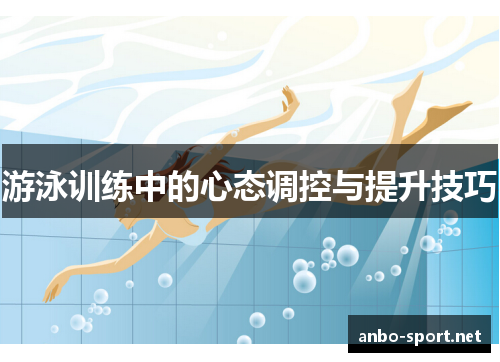Swimming Training: Enhancing Mental Attitude and Skills
Swimming is not merely a physical endeavor but also a mental challenge. This article explores strategies for improving mental resilience and skills in swimming training. It delves into techniques that can enhance performance by focusing on mindset, concentration, motivation, and psychological preparation. Each aspect is dissected to provide a comprehensive guide for swimmers aiming to optimize their training and competition outcomes.
1、Mindset Development
Maintaining a positive mindset is crucial in swimming, where mental fortitude often determines success. One effective approach is visualization, where swimmers mentally rehearse their races, envisioning every stroke and turn. This technique not only enhances confidence but also improves performance under pressure. Additionally, setting realistic goals helps in fostering a growth mindset, encouraging swimmers to view setbacks as opportunities for learning and improvement.
Furthermore, mindfulness practices such as deep breathing and meditation can significantly reduce anxiety and enhance focus during training and competition. By cultivating a resilient mindset, swimmers can navigate challenges with greater ease and consistency.
Developing mental toughness involves practicing perseverance and resilience in the face of adversity. Coaches play a vital role in nurturing this attribute by providing constructive feedback and creating a supportive training environment.
安博在线2、Concentration Techniques
Effective concentration is essential for maintaining peak performance throughout a swimmer's training sessions and races. One technique is chunking, where swimmers break down their races into manageable segments, focusing intensely on each part. This method prevents distractions and helps in maintaining optimal technique and pace.
Another concentration strategy involves establishing pre-race routines that include rituals or mental cues. These routines help swimmers enter a focused state of mind, enhancing their readiness and confidence before diving into the pool. Additionally, incorporating attention control exercises, such as focusing on specific stroke mechanics during drills, can sharpen concentration abilities over time.
Managing distractions, both internal and external, is crucial. Techniques like selective attention training can teach swimmers to filter out irrelevant stimuli and stay attuned to critical cues during races.
3、Motivation Enhancement
Motivation is the driving force behind consistent training and performance improvement. Setting both short-term and long-term goals that are specific, measurable, achievable, relevant, and time-bound (SMART goals) can boost motivation levels among swimmers. Celebrating small victories along the way reinforces positive momentum and encourages continuous effort.
Creating a supportive team environment fosters intrinsic motivation by promoting camaraderie and shared goals. Coaches can inspire motivation by highlighting individual strengths and progress, reinforcing a sense of purpose and accomplishment.
Furthermore, fostering a growth mindset encourages swimmers to view challenges as opportunities for growth rather than obstacles. This mindset shift promotes resilience and sustained motivation, even in the face of setbacks.
4、Psychological Preparation
Psychological preparation encompasses strategies that swimmers can use to manage stress and optimize performance under pressure. Implementing relaxation techniques such as progressive muscle relaxation or guided imagery sessions before races can reduce anxiety levels and enhance mental readiness.
Developing a personalized pre-race routine that includes visualization, positive self-talk, and physical warm-up routines can help swimmers enter a focused and composed state before competition. This routine primes both body and mind for peak performance.
Moreover, practicing mental rehearsal for potential race scenarios can build confidence and reduce performance anxiety. By visualizing successful outcomes and preparing for potential challenges, swimmers can approach races with a proactive mindset.
总结:

Swimming training demands not only physical prowess but also mental resilience and strategic preparation. By cultivating a positive mindset, sharpening concentration skills, enhancing motivation, and implementing effective psychological strategies, swimmers can optimize their training outcomes and achieve peak performance. These aspects work synergistically to empower swimmers to navigate challenges, maintain focus, and consistently improve their performance in competitive swimming.
Ultimately, integrating these mental strategies into training routines not only enhances performance but also fosters a deeper enjoyment and satisfaction in the sport of swimming.
游泳耐力训练与提升:科学方法与实用技巧
文章摘要的内容:本文将深入探讨游泳耐力训练与提升的科学方法与实用技巧。首先从基础训练、技术优化、营养调整以及心理建设四个方面详细阐述如何有效提升游泳耐力。每个方面将结合理论与实践,为游泳爱好者提供全面的训练指导。最后,总结归纳这些方法的关键要点,帮助读者更好地理解和应用。1、基础训练游泳耐力的基础训...
游泳训练必备!浮脚带完全指南及技巧分享
本文将深入探讨游泳训练中不可或缺的工具之一——浮脚带。浮脚带不仅是提升技术的好帮手,更是训练中的重要辅助工具。通过本文,你将全面了解浮脚带的选择、正确使用技巧以及如何在训练中最大化其效果。1、浮脚带的选择选择适合自己的浮脚带非常重要,它直接影响到训练的效果和舒适度。首先,浮力是一个关键因素,不同材质...